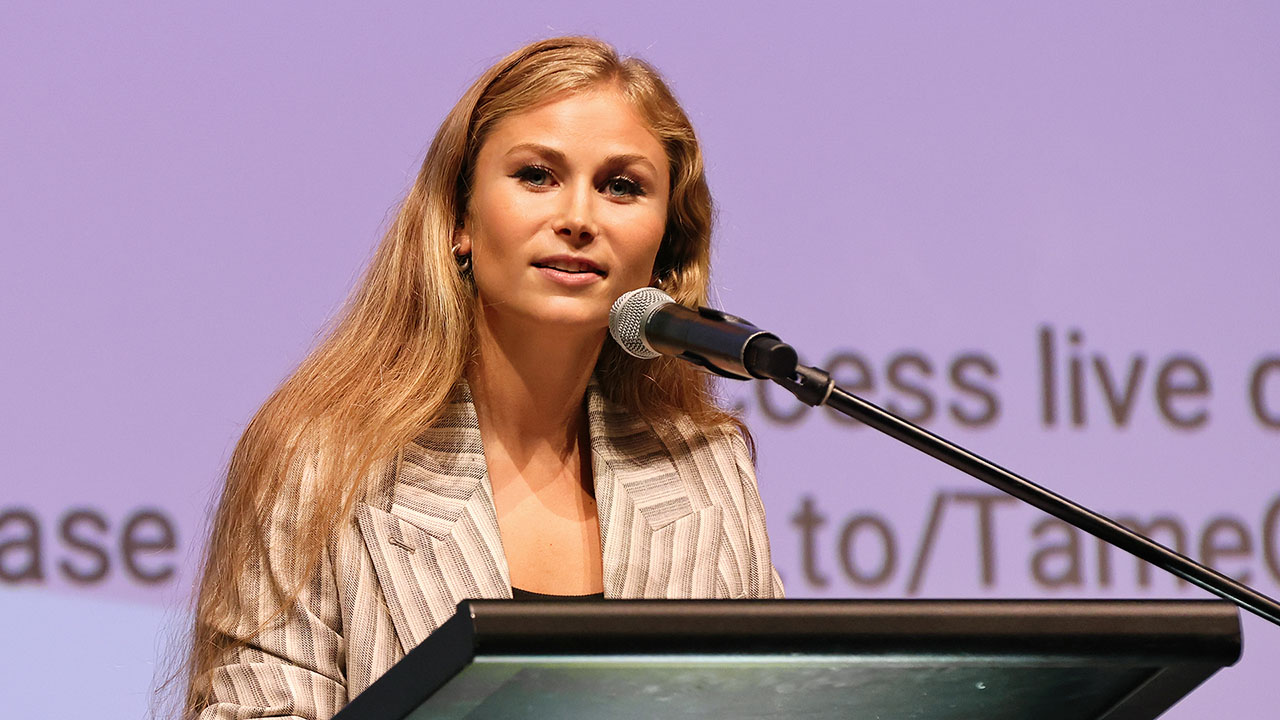Grace Tame: Speaking Out
Don't doubt your worth amongst the crowd, even if you just sign a petition or donate one dollar here and there – it all matters, it all counts, every single cent, every single signature, every single voice.
2021 offered a glimpse into the galvanising force of women’s collective voices, which, when harnessed can change history. Fierce females are not a recent phenomenon, but last year, the steady march towards equality has gained a rolling momentum which has been heard the loudest on the doorsteps of power. And through it all, Grace Tame was one of the powerful women leading the charge for change.
Hear Grace joined by Michael Salter, Kyllie Cripps, Emma A Jane and Ann Mossop in a conversation about the catalytic power of collective women’s voices, achieving better education on sexual abuse and Grace's aspirations to continue to hold those in power to account.
Please be aware that this podcast discusses sexual abuse and trauma which may be distressing for some people. Resources and support can be found here.
Transcript
Ann Mossop: Hello, and welcome to the UNSW Centre for Ideas podcast, a place to hear ideas from the world's leading thinkers and UNSW Sydney’s brightest minds. I'm Ann Mossop, director of the UNSW Centre for Ideas. This podcast was recorded on the lands of Bidjigal and Gadigal people. We pay our respects to their elders past and present, whose sovereignty was never ceded. The conversation you're about to hear, Grace Tame, Speaking Out, includes Grace Tame, Emma A Jane, Michael Salter, Kyllie Cripps, and myself, Ann Mossop, and was recorded live at UNSW Sydney. I hope you enjoy the conversation.
Ann Mossop: It's a great pleasure now to be joined by our panel, from my left, Sciantia Associate Professor Kyllie Cripps, one of Australia's leading researchers on Indigenous family violence, child abuse and sexual assault. She's Palawa woman from the Faculty of Law and Justice at UNSW and the co-convener of the Gendered Violence Research Network here at UNSW Sydney. She's worked extensively with Indigenous communities for over 20 years, identifying solutions to support better policy and practice that responds to the needs of Indigenous communities. Michael Salter is a criminologist and a Scientia Associate Professor in the School of Social Sciences in the Faculty of Arts Design and Architecture, where he studies gendered violence and complex trauma. He specializes in the study of organised sexual abuse and has researched and published widely on violence against women and children. He's an adviser to the Australian office of the E-Safety Commissioner and the Canadian Centre for Child Protection among other organisations. Emma Jane is an associate professor in the Faculty of Arts Design and Architecture, where her research specialties include gender, misogyny on the internet, and the social and ethical impact of emerging technology. She brings to her work a prior career as an award winning journalist. And I have to mention it, because today is a very important day, it’s publication day for her extraordinary memoir, Diagnosis Normal.
(Applause)
Diagnosis Normal: Living with Abuse, Undiagnosed Autism and Covid-grade Crazy, the book is officially published today, so we're delighted to have Emma with us to mark the occasion, and I encourage you to buy and read it. To our panel first, Michael, what has it meant to you in terms of your work, hearing Grace, for the last year, really changing the public conversation?
Michael Salter: I think it's been an absolute game changer. I mean, Grace said it herself. it's a moment in Australian history like never before, to have a survivor of child sexual abuse speak… so publicly speak. So honestly, and I think Grace has got a particular facility for presenting complex ideas and experiences with a lot of grace, I'll say, but also very succinctly, and with a lot of clarity. And I know, you know, just even, in my own personal circles, there have been people who have heard Grace talk about grooming, which is not really a conversation we've ever had at a national level before. And all of a sudden revisit something from when they're 14 or 15, and it makes sense to them, and they're able to understand it, and they realise for the first time, sometimes in decades, that it wasn't their fault. And, you know, that's been happening all around the country. And, you know, we can never go back, I think. The last 12 months has really changed the field.
Ann Mossop: Emma.
Emma A. Jane: Oh, look, I just love Grace. And I also, like, to be completely honest, I was so intimidated when I saw Grace, doing all of her awesome advocacy work, because, you know, I had gone through very similar experiences and had never spoken of it. It's still incredibly difficult. Right? So my heart… I do a lot of public speaking, and I'm never this nervous. And I gave myself all the trigger warnings before I turned up, you know, are you ready for this? It's so hard. It's so very hard. And on one hand, Grace was, you've been an incredible inspiration. But I've also had to go really easy on myself and my own journey towards being honest about what I went through, and that’s certainly what I really hope people take away from the last year is that it is terribly difficult. You know, MeToo makes it look easier than it is. It's terribly difficult and it's not a one off. You know, it comes up again and again and again. Do you tell? Do I tell now? Do I tell in this context? Is this the right person? So, I really hope that this year has given survivors the space to start talking or to choose not to, also, if that's what they need to do. That was a very personal answer wasn't it? I’m such a blurter.
Ann Mossop: Kyllie.
Kyllie Cripps: I take my hat off to you. You're incredibly brave in the conversations that you've had with the nation, and in the sharing of your story, Grace. And I think for any survivors, especially in the Indigenous community to hear your story, it gives people courage, and it gives people hope, to hear your story, and inspiration. And that's important. I think, in our community, we have particular challenges around finding the right place to share our stories, and finding that safe place to share to the right person at the right time. That's the hard part, it is trying to work out, you know, we live in a community that's so socially connected, and so we get to see a lot of stories around what's safe and what's not. And so our kids are often thinking about, who is the safe person to share their story with? And often our kids will see deaths in custody, they'll see kids that haven't had a good experience with police, and they're making judgement calls around, well, who do I tell? And then they're also having judgement calls or around what they've experienced in their own families. And how do I look after both myself and my family in sharing my story? And so our kids carry a huge burden, when they're thinking about how do they share their stories safely? Our kids in our communities carry a really significant burden of youth suicide. And that has a lot to do with child sexual abuse. And so the challenge for us in the Indigenous community is creating safe spaces for them to speak, and to break the silent codes that exist around child sexual abuse. That's our big challenge. And there are a lot of really wonderful community initiatives happening around creating that.
Grace Tame: Thank you. Can I just say, first of all, that's enough smoke up my ass. Can I just say a huge thank you, as well, because, first of all, standing on the shoulders of giants, so many people behind me, it's one thing to come along with a message, it's another thing to have that message be received, and so supported, I wouldn't be able to do it without all the people behind me. You know, my family believed me from day one, just the other day I was in the city of Casio, gave this speech, there was this beautiful woman from Afghanistan, we were standing there crying, she can't even tell her own husband that she was abused, because it is a national shame to be a woman who is you know, a child sexual abuse survivor, and that just ripped me apart. You know, this is we've got a long way to go, like, it is, like I am such a privileged person to be able to stand proudly on a platform as a child sexual abuse survivor in Australia. You know, like, I am an incredibly lucky person. But also just, you know, just to have such a huge support team, my partner, Max, you know, I'm an incredibly lucky person. I just feel that I have to say thank you to everybody here. That's just burning in my brain right now, so everyone, thank you. Thank you.
Ann Mossop: Well, you know, we've had our Grace Tame fan club moments. So that's good.
Grace Tame: Yes, thank you, that’s enough!
Ann Mossop: We are a university, we are about content. So I want us to talk a little bit about some of the issues that have been raised, in particular questions about education, about disclosure, about what works, and also to leave us as an audience with some positive things that we can be looking at for the future. Where are realistic possibilities for change, like the kinds of issues that Grace has brought up? Grace you spoke at the Press Club about two great priorities of education and prevention. I want to start by asking Michael and Grace, what could better education around child sexual abuse look like? And is grooming something in particular where public education could make a difference, do you think?
Michael Salter: I think that's absolutely right. We're in a position at the moment, I think it's similar to the conversation around domestic violence maybe 10 years ago. And of course, you know, Rosie Batty came along as, sort of, predecessor as Australian of the Year in 2015. And really reinforced, you know, domestic violence is not a series of violent incidents. It's a pattern of control. And in doing that, it's had a range of, sort of, consequences. It's given people the language to talk about their own experiences, to recognise the signs in their own life, or in the life of someone that they care about. But it's also just broadened out, it's disempowered perpetrators because the perpetrator tactics are known, and we've got a language for them. We're not in that position yet, with child sexual abuse, I think people still think about it as a series of incidents. And once we recognise that as a pattern of control, then it has much the same effect. It brings survivors on board, it gives them the vocabulary, the tools to unpack what happened to them, it allows us to speak to kids actually, really honestly about how sexual abuse unfolds, it means that perpetrators have less power, it opens up a range of opportunities. And so, I think education is really crucial here, and giving the public a different way of thinking and talking about child sexual abuse that really empowers us collectively.
Ann Mossop: Grace, did you want to add to that?
Grace Tame: Well, yeah, I mean, take my case, for example. It wasn't until I was 22 years old, seven years after I experienced child sexual abuse that I haven't heard of the word grooming, and it was only because I had decided to speak out about my experience, and not because I actually sat down and decided that I wanted to talk about it, it was, you know, it was indirectly, it was actually because my mother was studying at university, and this pedophile had got a federally funded PhD scholarship to study at university, and he was put into student accommodation with fresh 17 and 18 year old undergraduates. And, you know, she thought that that was not a good thing. And so, we were kind of like, there are some layers of injustice that we should probably expose. And it was because of that, that I thought here, I should probably tell my story, and then I was looking into something and I stumbled upon the word grooming. Now that shouldn't have been why I learned about grooming, you know, we should learn about this in schools, and not just a one off in year nine you might happen to learn about it, and if you have a sick day, well bugger you missed it. It should be built in like you learn about maths, you know, and okay, you're not teaching calculus to four year olds, you gradually work up and you tailor it, it should be in the education system, you know, all the way through, like subjects, there's a way to do that. And I was pleased to learn that when I went back to my high school last year that they have actually included it in the curriculum in a more permanent way. I don't know exactly what it looks like. But that's a private school, so I don't know what the public system looks like. But I think it needs to be a permanent part of the curriculum. And I think it needs to be every year. But there's also a place for, you know, because grooming is obviously quite a heavy subject. There's also a place for protective behaviours. And I was quite pleased to learn when I went to Perth last year, Max and I stumbled in on a workshop where there was this little four year old up on stage, demonstrating what they learned in a protective behaviours course, and the adult asked them, you know, can I have a hug? And this little four year old went, no. I never learned that as a kid, because I was always conditioned that, you know, I had to do exactly what an adult always wanted. And that, over time, that conditioning, I was always just terrified that I could never let an adult down. And I'm sure in some ways that played into being susceptible to, maybe, you know? So it's things like that.
Ann Mossop: Michael, are there jurisdictions that you know of where people are doing this well?
Michael Salter: Yeah, I mean, there’s a range of agencies services that offer curriculum around sexual violence prevention, and you know, increasingly we're seeing government commitment at the Commonwealth state and territory level to integrating a broad sort of respectful relationships curriculum from kindergarten into year 12. You know, there is resistance to this, we often do hear a lot of concern, particularly from, for example, the churches and religious communities. They do have concerns about teaching children about, from their point of view, about sex. And we really have to push back and and drive the point home that this is about protecting kids, and frankly, if we don't, and I'm sorry to put it this way, but if we are worried about introducing our children to sexual content, well frankly, perpetrators are not so worried about it, they will do it. And so it's really up to us, again to be making that connection with kids in an appropriate way, supporting healthy boundaries. Because when we leave that chink in the armor, I'm really sorry, but, you know, Grace is right that perpetrators are very predatory. They look for loopholes, they look for opportunities, they look for the gaps that we've left behind, and we have to be smarter than them.
Ann Mossop: I want to come back to Emma to talk more about that question that you raised about disclosure, and how difficult speaking out is and how we've all responded to the example of Grace’s speaking out. You said how hard it is generally, for women and for survivors. What makes it hard? I mean, one of the things I know we've discussed is the kind of responses people give…
Emma A. Jane: Yeah, but before we get, I mean, obviously, it's contextual. It's different for a kid than say, you know, a middle aged academic. But I'm at a bit of a loss at how the education would work. But I certainly think that we need to understand how grooming works a hell of a lot better. And it's such a distasteful thing to discuss and to understand, but I'd invite you to, some of you will know about it, because you've experienced it. But for those of you who, you know, this is perhaps unfamiliar territory, like Australia has one of the highest rates of sex abuse of girls in the world, it's the highest according to the latest prevalence studies, the average age is eight. So think about an eight year old. Think back to when you were eight. And the way that predators work is that, like all criminals, they don't want to fail, and they don't want to be caught. So they choose vulnerable eight year olds. And when you're eight, you are conditioned to believe grownups, You're conditioned to accept what grown ups say and the way that grooming works. Like it sounds like such a… almost gentle word. But it has a lot in common with the way cult leaders work. It has a lot in common with the way that, you know, in a war setting, it would be a form of torture, it's indoctrination. And so the way that grooming works is that children believe what the grown up tells them, and then they distrust their own version of reality. And then I think a useful metaphor is, you know, it's this sort of creepy app. That's always… because it doesn't leave you. You know, we know enough about neuroplasticity, and the way that predators rewire the brains of small people. And so you can be aware of it, and you can talk yourself off those ledges every single day, but paedophiles are world destroyers.
Grace Tame: Yeah, it stays, it stays with you. Like, now, you can still access me, today.
Emma A. Jane: Yeah, it's like they're up in your grill all the time. And I'm 52. And so, I was seven. Like that's decades and decades and decades and decades, and it’s with me every day. And so, too… I can't even remember the question. Why is it hard to disclose? Because when you emerge from that, you believe what the predator tells you that it is, it's all normal, but don't… it's our secret. If you tell anyone, bad things will happen. You know, you end up feeling complicit, at seven, you end up feeling complicit. At seven you don’t have the words to be able to name what you're going through. But you feel complicit, you get this weird sense of loyalty almost to your perpetrator. Like that's the hardest thing to understand, is that they set themselves up often as you know, you're your champion, or you know, it becomes a very confused sort of attachment. It's very hard to disclose when you're still trying to make sense of what happened, and still coming to terms with the fact that it wasn't your fault. That's the long answer.
Grace Tame: Because they do nice things as well. There's that aspect of maintaining control, which is, they give you gifts and give you compliments. You know, it's that cat and mouse. Have you ever seen anyone who's owned a cat that's ever caught a mouse and tortures them? I had a cat and I used to watch him on the lawn, and it sounds quite funny, but it's really quite cruel. They would let the mouse run away. and just as the mouse felt like, you know, he had freedom, and could play, the cat would just go, huh, again. And he would do it over and over and over and over. That's what perpetrators of sexual abuse are like. It's constant. You know? You feel like you have just enough agency as a child, just enough freedom. But really, you don't. You know, of any. It's really cruel. It's really cruel. And it's really hard to explain to anybody who hasn't actually been through it. What it's like.
Emma A. Jane: Well the perpetrators groom communities and caregivers too.
Grace Tame: Yes.
Emma A. Jane: Like, even if you aren't a survivor yourself, you may well have been groomed, because perpetrators are often charismatic. They know how to work a room. They know how to establish a sense of trust in their victims and targets, but also in the people that are tasked with protecting those kids. They abuse in plain sight.
Ann Mossop: Kyllie, can I ask you to talk about what you have learned from working in First Nations communities, and what the kinds of things that you're doing to try and improve the policy response, the practical tools that people have. What's lacking in our current response to child sexual abuse, and gendered violence in Indigenous communities?
Kyllie Cripps: I think what's lacking is a willingness sometimes to just sit and listen, when we go out into communities, the communities know the local context, they know what's happening in terms of their local environment, they know what the problem is, and where the problems exist. And they know what the solutions are. They know what they need to do to respond to that. And they just need the resources to be able to be empowered to respond to it in a way that's going to be culturally appropriate and culturally sensitive to that. When it comes to responding to child sexual abuse, it’s about having the skilled resources in that sector. We don't have, in the Indigenous community, enough skilled counsellors to respond that are culturally appropriate. I can remember a few years ago working with an elders group that was responding to child sexual abuse. And they were amazing, absolutely amazing. They were sitting down with kids, with puppets, they'd done all the training around puppets. And were doing that training with the kids, and doing the counselling with kids around puppets. And one of the things that was really important, and really significant to that group, was about having their own self determination, they’d had government agencies come to them and say, we'll give you this kind of money to do this work and to scale up your work to put this more broadly around communities. And the response by the elders was, we don't want your money, because that would constrain their efforts, it would constrain the work that they were trying to do. And they didn't want to be constrained in what they were trying to do. They wanted support to be able to do their work their way, using their own self determination. And, you know, they didn't want to be tied to a contract that said they had to do it a particular way, in a particular time frame. They wanted to be able to do their response, in their time, and in a responsive way that was appropriate to what their kids needed, what their community needed. And it was the most empowering thing I've ever seen, sitting with those elders. And I can remember going to those meetings and sitting. I was invited to their meetings and their planning days. And Uncle George, you know, I'm sitting at the meeting. And Uncle George says, Kyllie , you haven't said anything this morning. And I said, well, you know, I'm learning Uncle George from you, and, you know, I didn't feel it was appropriate to interrupt, because, you know, I'm, I'm a young person, and it's not appropriate to interrupt elders. And his response was, you're from that big institution, your response is to come here and teach us as well, this is a mutual learning. You need to be contributing to us as well. And so that was the start of us sharing. And I think that that's something that's really important to these conversations, is that, when we're invited to be part of these conversations, when the Indigenous community invites us in, we're there to share our resources, our skills, and to support them in that endeavour. Because we need that, our communities need our skills to fight what's going on in our communities around violence.
Ann Mossop: There's so much to talk to all of you about from your different areas of expertise. But I'm going to ask Grace to finish up our conversation, by talking to us about, you know, in the last year, you've seen what the political and social landscape is like in terms of trying to achieve change. What are you optimistic about your work being able to achieve?
Grace Tame: This movement feels particularly momentous, and isn't going to fizzle out. It's about being smart, and steady. And with our foundation, in particular, we've carved out a very specific niche, and we're moving one step at a time. While we've got quite a big overarching goal, and that is, you know, greater harmony between the jurisdictions on sexual assault legislation, which, in general is, like I said, you know, quite big, we are going one piece of legislation at a time, and that is quite achievable. And we've already had some big wins, and we're not biting off more than we can chew. And we've really put together a very strong team, we've got a strong advisory board. We've got a team that we've had sort of since day one, Nina Funnell is on that team, she was the creator of the Let Her Speak campaign, and she deserves a huge shout out because I wouldn't be here, I wouldn't have a voice without her. You know, as well, we've got Michael Bradley from Marque Lawyers. Not that I am a big advocate for social media if you don't need it, but you should go and follow Marque Lawyers on Twitter because they're hilarious. Do you follow Marque Lawyers? I’m sure you do. But we've got Michael Bradley, who's the managing partner of Marque Lawyers, we've got the former CEO of WorldVision on our board as well, we've got a really great team. So I'm really hopeful about achieving a lot of success with our foundation, you know, and some really clear law reform goals. But beyond that, for the average person, wondering what they can do, and trying to find a little bit of hope, you know, if you're doubtful and feeling overwhelmed, I'd like to leave you all with a story dating back to the Let Her Speak campaign. And it ties into this sort of idea of the domino effect. And that's about the petition, to change the law to actually get survivors, their voices. You know, you might think that one signature on a petition isn't very much, but when you put them all together, now there were 8154 total signatures on this petition. Often we don't have an optic reference for change, because it's really hard to measure. But actually, Nina Funell decided, as a gift, when I got an exemption to the law before it was actually changed. I was given a special exemption which made me the first female Tasmanian child sexual abuse survivor to have a public voice. As a gift, she actually printed out all the signatures, so we got to actually see what that looks like. Turns out, that looks like the size of an old phonebook. If you remember what that looks like. So there you go. Signature by signature, we changed the law and it looks like a phone book. Don't doubt your worth amongst the crowd. Even if you just sign a petition, or donate $1 here and there, it all matters, it all counts, every single cent, every single signature, every single voice. So yeah, I'm hopeful.
Ann Mossop: This event was presented by the UNSW Centre for Ideas. Thanks for listening. For more information visit centreforideas.com, and don't forget to subscribe wherever you get your podcasts.
Image Gallery
Grace Tame: Speaking Out at the Roundhouse, UNSW Sydney
-
1/3
Ann Mossop, Kyllie Cripps, Grace Tame, Michael Salter and Emma A Jane in a panel discussion at Grace Tame: Speaking Out.
-
2/3
Grace Tame: Speaking Out panel discussion live at the Roundhouse.
-
3/3
Grace Tame speaking live at the Roundhouse.
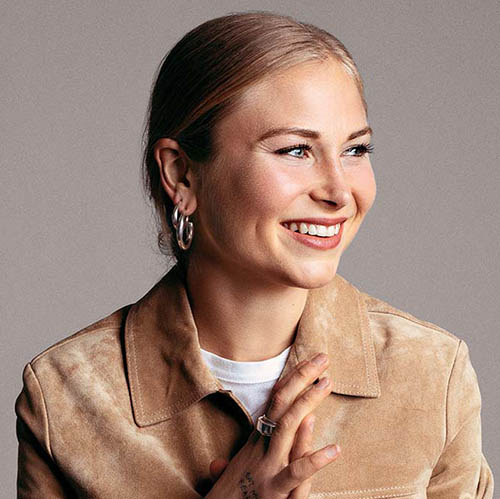
Grace Tame
After being groomed and raped by her maths teacher when she was just 15 years old, Grace Tame has spent the last 10 years turning her traumatic experience into being an advocate for survivors of child sexual abuse and a leader of positive change. Recognising the injustice of Tasmania’s gag order that prevented survivors from self-identifying publicly, Grace offered her story to the #LetHerSpeak campaign created by Nina Funnell, along with the stories of 16 other brave survivors. In 2019, she finally won a court order to speak our under her own name, making her the state’s first female child sexual abuse survivor to do so.
Now 26 and based in Hobart, Grace is dedicated to eradicating child sexual abuse in Australia, and supporting the survivors of child sexual abuse. Her focus is around enabling survivors to tell their stories without shame, educating the public around the process and lasting effects of grooming and working with policy and decision-makers to ensure we have a federal legal system that supports the survivors, not just the perpetrators. She is also a passionate yoga teacher, visual artist, and champion long-distance runner, having won the 2020 Ross Marathon in a female course record time of 2:59:31. An open book about her experience, but even more passionate about preventing this from happening to other children, Grace speaks from the heart and will have her audience simultaneously inspired and in tears. She is a regular keynote speaker, media guest and advocacy commentator.
Grace was the 2021 Australian of the Year.
Ms Grace Tame appears by arrangement with Saxton Speakers Bureau.
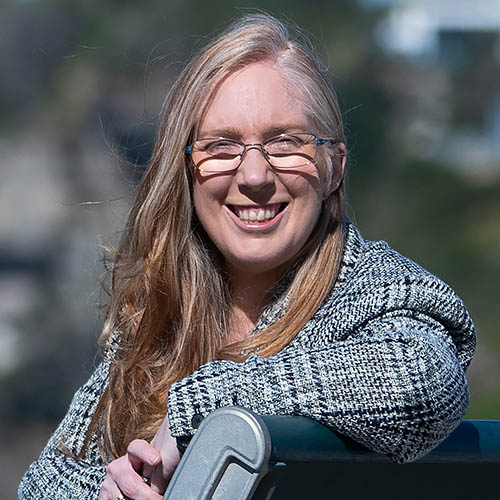
Kyllie Cripps
Dr Kyllie Cripps is a Scientia Associate Professor in the Faculty of Law and Justice and Co-Convenor of the Gendered Violence Research Network at the University of New South Wales, Sydney. Kyllie as a Palawa woman has worked extensively over the past twenty years in the areas of family violence, sexual assault and child abuse with Indigenous communities. She has contributed to the evidence base through empirical studies that have defined violence on Indigenous terms, identified the factors contributing to violence, as well as examined Indigenous peoples’ access and availability to services in the aftermath of violence. Her work has also been responsive to providing solutions to support policy and practice change.
Kyllie places a high priority on knowledge exchange ensuring that her research is communicated to State and Federal governments; but more critically that the research is available and accessible to Indigenous communities, to that end she routinely provides advice, support and training to communities and professional groups in her areas of expertise.
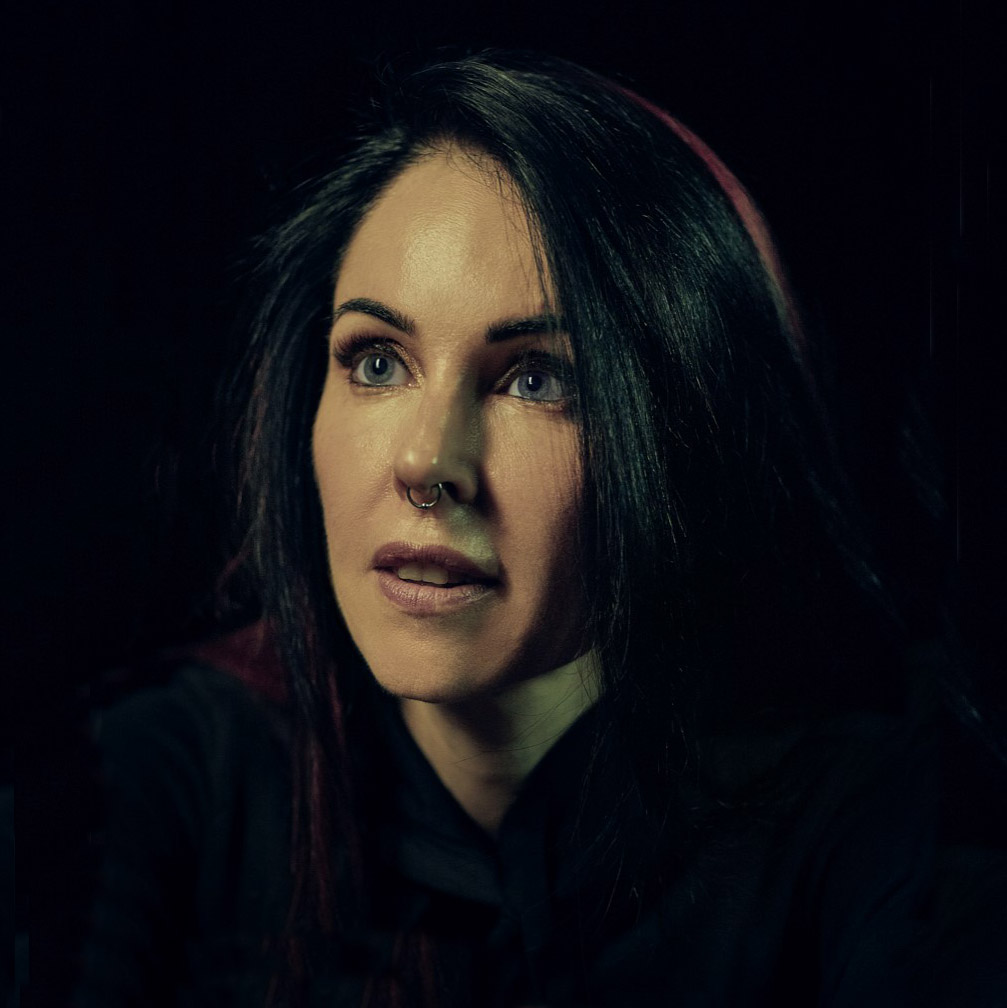
Emma A. Jane
Emma A. Jane – previously published as Emma Tom – is a writer and academic based at UNSW Sydney. Her research interests are eclectic and include: ethical tech design; artificial intelligence; sex and gender; LGBTQI+ issues; and wrangling super wicked problems in complex systems. Prior to her career in academia, Associate Professor Jane spent nearly 25 years working in the print, broadcast, and electronic media. Over the course of her working life, she has received multiple awards and prizes for her scholarly work, her journalism, and her fiction. Diagnosis Normal is her 11th book.
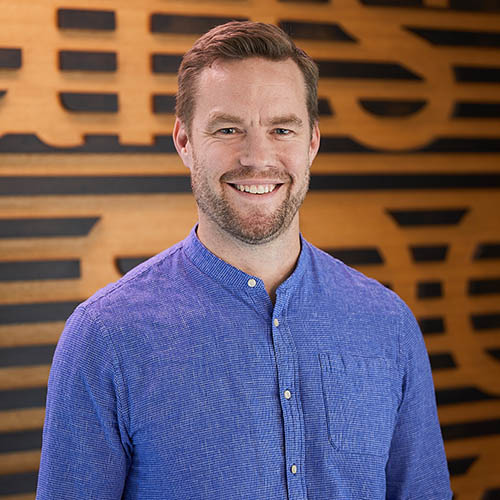
Michael Salter (Chair)
Dr Michael Salter is a Scientia Associate Professor of Criminology at UNSW Sydney, where he specialises in the study of child sexual abuse and exploitation. He is an advisor to a range of national and international agencies, including the eSafety Commissioner, White Ribbon Australia, the Grace Tame Foundation and the Canadian Centre for Child Protection. He is the President-Elect of the International Society for the Study of Trauma and Dissociation.
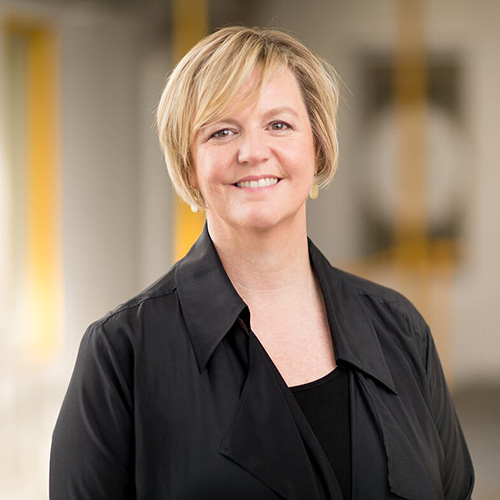
Ann Mossop | Chairperson
Ann Mossop is the Artistic Director of Sydney Writers’ Festival, and was previously the Director of the Centre for Ideas at UNSW Sydney. She also held the position of as Head of Talks and Ideas at the Sydney Opera House from 2010–2017. She established the Opera House’s extensive talks and ideas program and lead key projects like the Festival of Dangerous Ideas and All About Women. Throughout her career she has been involved with important initiatives to bring the work of writers and thinkers to broader audiences, from the pioneering series Writers in the Park to the re-establishment of the Sydney Writers’ Festival.
